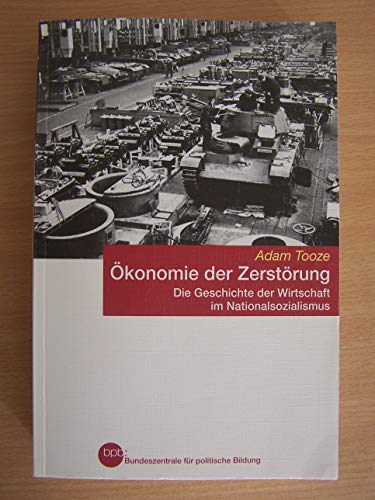Verwandte Artikel zu Ökonomie der Zerstörung: Die Geschichte der Wirtschaft...

Inhaltsangabe
The idea that Nazi Germany was an unstoppable juggernaut, backed by an efficient, highly industrialized economy, has been central to all accounts of World War II. But what if this was not the case? What if the war had its roots in Germany's weakness, not its strength? This is the radical argument in this pathbreaking book, the first account of the Nazi era for the twenty-first century and our globalized world.There was no aspect of Nazi power untouched by economics, yet Adam Tooze is the first to place economics alongside race and politics at the heart of the story of the Third Reich. And America, in Tooze's view, is the true pivot for Hitler's epic challenge to a shift in the world order. Hitler intuitively understood how Germany's relative poverty in the 1930s was the result not just of global depression, but also of Germany's limited resources. He predicted the dawning of a globalized world in which Europe would be crushed by America's overwhelming power, against which he saw only one last a German super-state dominating Europe. Doing what Europeans had done for three centuries, he sought to carve out an imperial hinterland through one last land grab to the east, to give him the self-sufficiency to prevail in the coming superpower competition. With the odds stacked against him, he launched his underresourced armies on their unprecedented and ultimately futile rampage across Europe.Hitler knew by the summer of 1939 that his efforts to prepare for a long war with the West were doomed to failure. Ideology drove him forward. Hitler became convinced that Jewish elements in Washington, London, and Paris were circling round him, and from 1938, the international "Jewish was synonymous with America in his mind. Even in the summer of 1940, at the moment of Germany's greatest triumphs, Hitler was still haunted by the looming threat of Anglo-American air and sea power, orchestrated by, he believed, the world Jewish conspiracy.Tooze also casts a stark new light on Albert Speer's role in sustaining the Third Reich to its bloody end, after the catastrophe of the Soviet invasion. Speer, Tooze proposes, was no apolitical agent of technocratic efficiency but a Hitler loyalist who would stop at nothing to continue a hopeless battle of attrition, at the cost of tens of millions of lives.The Wages of Destruction is a chilling work of originality and tremendous scholarship that will fundamentally change the way in which we view Nazi Germany and the Second World War.
Die Inhaltsangabe kann sich auf eine andere Ausgabe dieses Titels beziehen.
- VerlagBundeszentrale fur politische Bildung
- ISBN 10 3893318224
- ISBN 13 9783893318223
- EinbandPaperback
- Kontakt zum HerstellerNicht verfügbar
Gebraucht kaufen
Zustand: BefriedigendGratis für den Versand innerhalb von/der Deutschland
Versandziele, Kosten & DauerSuchergebnisse für Ökonomie der Zerstörung: Die Geschichte der Wirtschaft...
Ökonomie der Zerstörung. Die Geschichte der Wirtschaft im Nationalsozialismus
Anbieter: Studibuch, Stuttgart, Deutschland
paperback. Zustand: Befriedigend. 926 Seiten; 9783893318223.4 Gewicht in Gramm: 2. Bestandsnummer des Verkäufers 893005
Anzahl: 1 verfügbar
Ökonomie der Zerstörung. Die Geschichte der Wirtschaft im Nationalsozialismus Drittes Reich Zweiter Weltkrieg Geschichtsunterricht Rassenhaß Gewaltpolitik Volk ohne RaumWehrbauern totaler Krieg Kriegswirtschaft Wirtschaftsgeschichte nationalsozialistische Wirtschaft Hitlers Weg Macht 1939 Europa England Sowjetunion USA nationalsozialistische Politik Rassenbiologie Supermacht Deutschland Herrschaftssystem Adam Tooze, Yvonne Badal
Anbieter: BUCHSERVICE / ANTIQUARIAT Lars Lutzer, Wahlstedt, Deutschland
Softcover. Zustand: gut. 2007. Die erste umfassende Wirtschaftsgeschichte des »Dritten Reichs«. Ein Standardwerk. Adam Tooze entwirft in seiner fulminanten Gesamtdarstellung der nationalsozialistischen Wirtschaft eine neue Sicht auf die Geschichte des »Dritten Reichs« und den Zweiten Weltkrieg. Er weist nach, dass Hitlers Weg zur Macht, seine »Erfolge« vor 1939 und alle seine Entscheidungen während des Kriegs stets von wirtschaftlichen Interessen mitbestimmt wurden. Die Vorstellung, das »Dritte Reich« sei gleichsam ein unaufhaltsamer Panzer gewesen, angetrieben von einer heiß laufenden Wirtschaft, galt lange Zeit als eine zentrale Erklärung für den Verlauf der Geschichte des Nationalsozialismus. Doch diese Grundannahme ist falsch, wie Adam Tooze überzeugend zeigen kann. Deutschland war nie stark genug, um Europa zu beherrschen und England, die Sowjetunion oder gar die USA dauerhaft zu besiegen. Richtig jedoch ist, dass wirtschaftliche Überlegungen die nationalsozialistische Politik ab 1933 stark beeinflusst haben. Hitlers Weltbild war nicht nur politisch und rassenbiologisch, sondern in hohem Maße auch ökonomisch geprägt. Deutschland sollte nicht nur eine militärische, sondern auch eine wirtschaftliche Supermacht werden, koste es, was es wolle. Dieser rücksichtslose Plan war von vornherein zum Scheitern verurteilt, doch vermochte er den halben Kontinent zu verwüsten und Millionen von Menschenleben zu vernichten. Mit seinem Buch legt Adam Tooze eine Geschichte der Wirtschaft im nationalsozialistischen Deutschland vor, die einen neuen Blick auf das Herrschaftssystem des »Dritten Reichs« und den Verlauf des Zweiten Weltkriegs eröffnet. Für den Geschichtsunterricht die ökonomische Umsetzung ideologischer Vorgaben(Rassenhaß,Gewaltpolitik,Volk ohne Raum,Wehrbauern) Der Tod ist ein Henker aus Deutschland Es ist eindrucksvoll dargestellt,daß Hitler trotz äußerster voluntaristischer Anstrengungen - totaler Krieg- an den kriegswirtschaftlichen Gegebenheiten scheitern mußte. Ökonomie der Zerstörung. Die Geschichte der Wirtschaft im Nationalsozialismus Drittes Reich Zweiter Weltkrieg Geschichtsunterricht Rassenhaß Gewaltpolitik Volk ohne RaumWehrbauern totaler Krieg Kriegswirtschaft Wirtschaftsgeschichte nationalsozialistische Wirtschaft Hitlers Weg Macht 1939 Europa England Sowjetunion USA nationalsozialistische Politik Rassenbiologie Supermacht Deutschland Herrschaftssystem Adam Tooze, Yvonne Badal In deutscher Sprache. 928 pages. Bestandsnummer des Verkäufers BN32334
Anzahl: 1 verfügbar
Ökonomie der Zerstörung. Die Geschichte der Wirtschaft im Nationalsozialismus [Paperback]
Anbieter: BUCHSERVICE / ANTIQUARIAT Lars Lutzer, Wahlstedt, Deutschland
Zustand: gut. Rechnung mit MwSt - Versand aus Deutschland pages. Bestandsnummer des Verkäufers 5M-BW7F-K1TG
Anzahl: 1 verfügbar
Ökonomie der Zerstörung. Die Geschichte der Wirtschaft im Nationalsozialismus [Paperback]
Anbieter: BUCHSERVICE / ANTIQUARIAT Lars Lutzer, Wahlstedt, Deutschland
Zustand: gut. Rechnung mit MwSt - Versand aus Deutschland pages. Bestandsnummer des Verkäufers 67-VPZE-2AH3
Anzahl: 1 verfügbar

